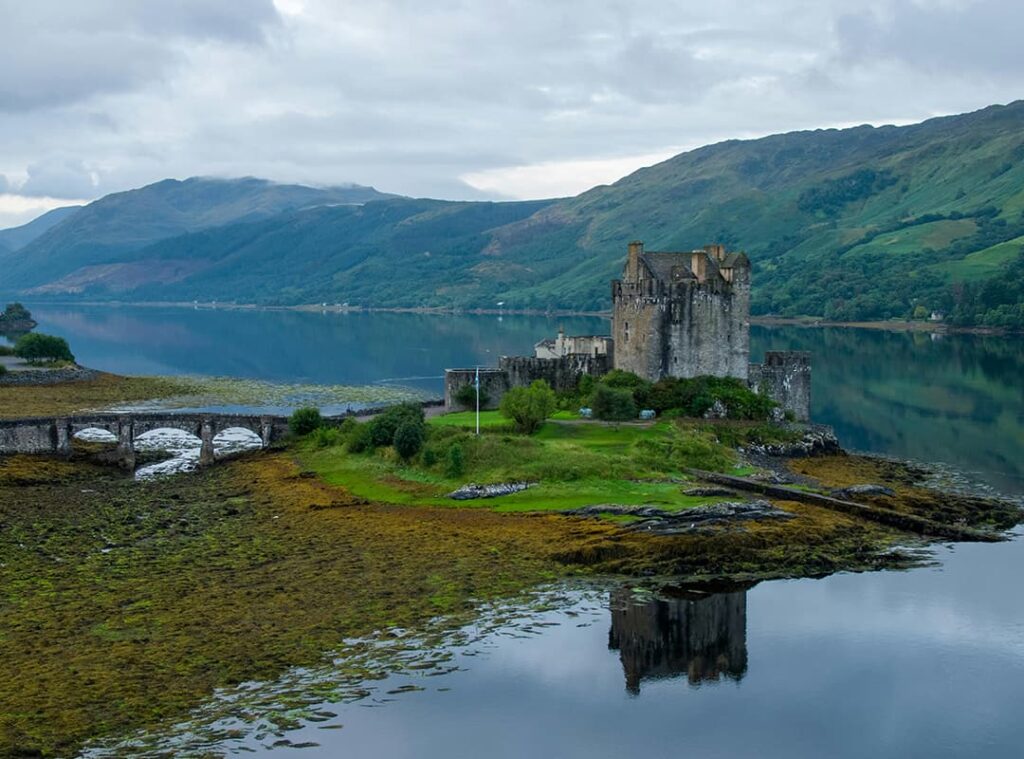Scotland has always dreamed of independence, fought for it, but never got it. Nevertheless, it has preserved the proud spirit of the descendants of the Highlanders, which still lives in each of its inhabitants. This is a wonderful country of cold beauty of nature, hot drink whiskey, changeable weather and cheerful pleasant people. And although the climate here is not spoiling, entertainment and attractions in Scotland are in abundance – there is even surfing! Walking through ancient castles, trout fishing, whisky tasting and playing golf (better the other way around) are traditional for this region. No wonder that the beautiful country has inspired such talented writers as Robert Burns, James Matthew Barrie, Robert Stevenson, Walter Scott and Arthur Conan Doyle to create magnificent literary masterpieces.
Geography
Scotland is located in the northern third of the island of Great Britain. Its possessions include the Hebrides, Orkney and Shetland Islands. The country is bounded by the Atlantic Ocean to the northwest, the North Sea to the east, and the Irish Sea to the southwest. On land, Scotland neighbors England. The sea separates it from Ireland, Norway, Iceland and the Faroe Islands. Scotland includes about 790 islands, the largest of which is Lewis and Harris, with an area of 2,225 km².
About 90% of the UK’s freshwater supply is found within Scotland. Freshwater bodies of water here are called “lochs”. The largest loch in the country in terms of area is Loch Lomond, and in terms of volume is Loch Ness (it contains more water than the whole of England and Wales). There are 10 main rivers, the longest of which is the Tay (193 km).
Scotland is the most mountainous country of Great Britain, and its relief is represented by the South Scottish Uplands, the Mid-Scots Lowlands and the North Scottish Highlands.
It is home to approximately 5,200,000 people. Being an autonomous administrative and political part of Great Britain Scotland is divided into 8 regions, which include 32 areas. The legislative body is the Parliament, and the executive body is the Government.
National peculiarities of the inhabitants of Scotland
- Tipping in Scotland is customary in restaurants, if you are satisfied with everything – 10% of the bill will be enough. There is no such practice in pubs and bars. But in the case when there is such a desire (you liked the excellent service, drink or lively conversation), it will be appropriate to leave 1 pound.
- The official language in Scotland is English. But, in addition to it, Scottish Gaelic is used here – in Highland Scotland and the islands, as well as English-Scottish – in the flat part of Scotland.
- Road signs are written in two languages – the first line of names is written in Gaelic. In the same order of writing you can see banners telling about local attractions.
- Hunting wild pigeons is one of the favorite activities of the Scots. The food prepared from them is considered a delicacy.
- The national dish is haggis. It consists of mutton giblets, oatmeal, onions and spices, with which the mutton intestine is filled. It is served in all catering establishments and sold in supermarkets (raw).
- After the end of the working week, all adult Scots spend their evenings in pubs. Their aim is to visit as many establishments as possible during the evening and drink a pint of beer in each. And the customers are checked for ID before alcohol is sold.
- One of the popular pastimes in Scotland is fishing. There are more than a thousand lakes and a hundred rivers where you can catch salmon and trout. They are the main target of lovers of sitting with a fishing rod.
- The season opens in April and lasts until October. According to local laws, you can only fish from Monday to Saturday, but you must obtain a permit.
- Buses here, as in England, are double-decker. At the entrance passengers drop coins for travel into a special machine, it also issues tickets.
- The national instrument is the bagpipe. It has a piercingly strong sound, under it the Scots went into battle. Nowadays the popularity of bagpipes among Scots has not become less. For example, its sound welcomes visitors to the railway station Wherley in Edinburgh.
- The Scots divide the world into the English and everyone else.
- They dislike the prim inhabitants of Foggy Albion and do not try to hide it much. There are no military conflicts between them, and the clarification of relations has moved to the fields of international sports competitions. Cheerful Scots do not hide their pleasure at the defeat of the English and always root for their opponents.
- If you dream of a high title, in this country it is enough to buy 1 square foot of land to get the title of lord.
